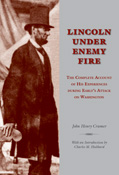Lincoln Under Enemy Fire
The Complete Account of His Experiences during Early's Attack on Washington

- Author(s): Cramer, John Henry
- Series:
- Imprint: Univ Tennessee Press
- Publication Date: 2009-10-23
- Status: Active
- Available in Hardcover - Cloth: Price $35.00 | Buy Now
“No work on just Fort Stevens has been written since Cramer’s classic originally appeared in 1948. . . .Cramer’s great little volume deserves to be reprinted and now is the perfect time to reissue it for the Lincoln Bicentennial.”—Wayne C. Temple, Illinois State Archives
“Before the tragedy improvised by John Wilkes Booth in Ford’s theater, Lt. Oliver Wendell Holmes, future celebrated Supreme Court justice, averted a tragedy in the theater of war by yelling at his President, ‘Get down, you damned fool!’ Inspired by that near-miss at Fort Stevens outside Washington and by various other versions of it, John H. Cramer wrote Lincoln Under Enemy Fire, endearing himself to a great number of readers who will rejoice that it is back in print and a growing number who will delight in discovering it.”—David Madden, Chair, Louisiana Abraham Lincoln Bicentennial Commission
Originally published in 1948 but long unavailable, this intriguing book chronicles the strange events of midsummer 1864, when President Abraham Lincoln might well have succumbed to a Confederate bullet were it not for the fortuitously spoken words of a Union officer standing nearby.
The central story is fairly well known: In July, the Confederate Army contemplated an attack on Washington, D.C. The Union showed sufficient strength to discourage a full-blown Southern assault, but on July 11, skirmishes broke out near Fort Stevens, just a few miles from Washington. High government officials and the social elite from the area came to the fort to observe the battle. Among them was President Lincoln, along with his wife and at least two cabinet-level officers. During his visit, the president joined a few others on a walkway that ran along the top of one of Fort Stevens’s high defensive walls. Confederate sharpshooters opened fire on the group, and Lincoln was told to retreat to a safer location—in rather rude and emphatic terms, according to some accounts. Author John Henry Cramer frames Lincoln Under Enemy Fire around two questions: Who told the president to get off the parapet, and what was said to persuade him to do so?
With this new edition, Cramer’s findings become available once again, complete with a new introduction by noted Lincoln scholar Charles Hubbard. Lincoln Under Enemy Fire, at its heart, is a book about Abraham Lincoln, and validates some assumptions about Lincoln that have developed since Cramer wrote the book. Much of Cramer’s attention is directed toward the various accounts—including eyewitness discrepancies and written communication—and this meticulous work shows a brilliant mind at work getting to the bottom of a historical mystery of the first order.
John Henry Cramer was professor of history at Youngstown College (now Youngstown State University). He was also the author of Lincoln in Ohio. He died in 1948.
Charles M. Hubbard is professor of history at Lincoln Memorial University and the author of The Burden of Confederate Diplomacy.
